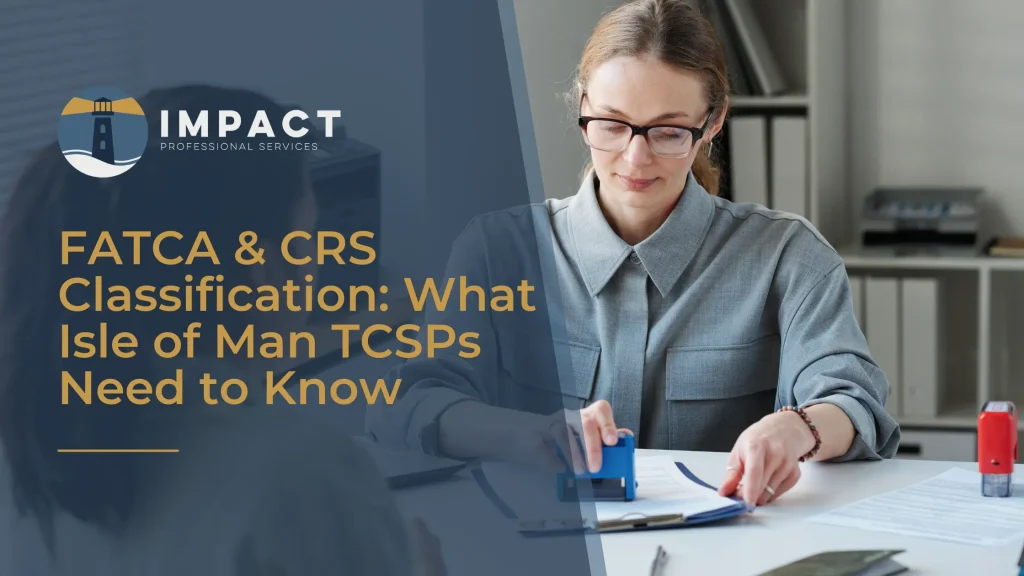
If you’re a Trust Service Provider (CSP/TCSP) in the Isle of Man, understanding FATCA (Foreign Account Tax Compliance Act) and CRS (Common Reporting Standard) classification is non-negotiable. These international tax transparency frameworks require financial institutions and certain non-financial entities to identify and report information about their clients to tax authorities.
What Are FATCA & CRS?
- FATCA is a U.S. law requiring financial institutions worldwide to report details on U.S. persons with financial accounts.
- CRS is a global initiative led by the OECD, requiring financial institutions to report on account holders from participating jurisdictions.
Both aim to combat tax evasion by ensuring offshore financial accounts don’t go unreported.
Why It Matters for TCSPs in the Isle of Man
The Isle of Man, as a well-regulated jurisdiction, enforces FATCA and CRS compliance. TCSPs must determine whether their entities fall under the definition of a Financial Institution (FI) or a Non-Financial Entity (NFE) – which affects reporting obligations.
- If classified as an FI, you must identify reportable accounts and submit annual reports to the Isle of Man tax authorities.
- If an NFE, you may need to provide information to other institutions for their compliance.
Misclassification can lead to penalties and reputational damage. Getting it right protects your business and clients while maintaining the Isle of Man’s strong regulatory standing.
We caught up with FATCA / CRS expert, Richard Parkinson to talk about how his new classification tool Classifi, designed specifically for TCSPs, automates the classification process.
Simplifying FATCA & CRS Classification: The Smarter Way Forward
For Trust and Corporate Service Providers (TCSPs), navigating the complexities of FATCA and CRS classification can be a time-consuming, resource-heavy process. With evolving regulations and increased scrutiny from tax authorities, the pressure to ensure accurate and consistent classification has never been higher.
Yet, for many firms, the process remains manual—reliant on spreadsheets, internal notes, and an ever-growing stack of guidance documents. But what if there was a way to streamline classification, reduce risk, and save valuable time?
The Classification Challenge
FATCA and CRS classification isn’t just about ticking boxes. Each entity – whether it’s a trust, company, partnership, or fund – must be assessed against detailed criteria to determine its financial institution (FI) or non-financial entity (NFE) status.
Misclassification can lead to:
✅ Reporting errors that trigger audits and penalties
✅ Unnecessary due diligence burdens
✅ Reputational risks for non-compliance
For TCSPs managing multiple client entities across different jurisdictions, maintaining accuracy and consistency is a significant challenge.
A Smarter Approach to Classification
Technology is transforming regulatory compliance, and FATCA/CRS classification is no exception. Classifi, a new classification tool designed specifically for TCSPs, automates the classification process with precision and ease.
🔹 Automated Decision-Making – Simply input entity details, and Classifi determines its FATCA and CRS status based on the latest regulatory guidance.
🔹 Built-In Compliance Logic – No need to cross-reference multiple sources; Classifi applies up-to-date rules automatically.
🔹 Audit-Ready Reports – Generate clear, structured classification reports for internal records or external auditors.
🔹 Time & Cost Efficiency – Eliminate hours of manual work, allowing teams to focus on higher-value tasks.
Why Review your FATCA/CRS Process Now?
With increasing global regulatory enforcement, there has never been a better time to refine your classification process. Ensuring consistency and accuracy from the outset reduces compliance risk and helps firms stay ahead of potential regulatory changes.
Regulatory Update: The Crypto-Asset Reporting Framework
As digital assets continue to gain prominence, the introduction of the Crypto-Asset Reporting Framework (CARF) is set to reshape tax transparency standards and increase complexities within reporting. This framework will become live on the Isle of Man in 2026 with the first reporting under CARF to take place in 2027.
Whether you’re classifying a single client entity or managing a portfolio of structures, leveraging the right technology and automation can ensure you are future-ready.
Want to see how Classifi can work for your business? Get in touch with Classifi’s Director, Richard Parkinson on 07624 428793 or by email to [email protected].

